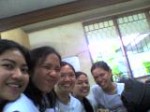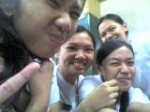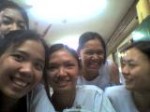THE CASE OF A. C.
During my fieldwork at NCMH, I was able to handle a 40-year old, female patient with schizophrenia of undifferentiated type. We were not informed of the diagnosis of the patients at the start of the session so as I was going on with the interview; I relied solely on my observations and on my pre-conceived notions about mentally ill individuals. It was in fact difficult to determine the case of my patient per se because in one look, you wouldn’t actually notice anything wrong about her. She has no delusions or hallucinations. She wasn’t aggressive at all, and there weren’t even any hint of flight of ideas or loose association of thoughts. Her mood was euthymic and her affect was appropriate. The only clue that gave her away was the fact that she was actually staying in a mental institution. It was only after I had gone through history-taking that I noticed some discrepancies in the information she provided as compared to that contained in her medical charts. It was documented in her charts that she was 40 years old, single and was admitted in the year 1998. Contrary to what she told me that she was 39 years old married with a 15-year old son and was admitted on 2002. I was asking myself then, was it a question of orientation or deficits in memory? Or was it her reliability as an informant? Since there wasn’t any caregiver/family member present at the time the interview was conducted to compare the information gathered.
Throughout the interview and the evaluation session, I kept wondering, was it a case of MDD or schizophrenia?what type then? Occupational therapists don’t make diagnoses, that I know, so medical diagnosis given before hand will be very useful. But in cases such as I had encountered, I tried to recall all my stored bulk of information about psychiatric conditions from the back of my mind to help me figure out what to do in the evaluation. There wasn’t stated an exact or clear cause of her condition except that client sustained a fall from the rooftop to the ground a couple of years ago and I presumed it to have contributed to the etiology of the disorder. I know that schizophrenia is idiopathic in nature. At the end, I verified my speculations to be true. My client told me that the barangay officials of their town brought her to NCMH when she was seen wandering aimlessly around the streets for days. She admitted that none of her family in Parañaque, even her relatives in the province knew where she was, of what had happened to her and what has been going on with her now. It was a bit disheartening but then, one must not be overridden by emotions.
Client stated that her primary goal is to get back to her previous work as a helper and a nanny to a one-year old child. This sort of served to be my first dilemma. I’ve decided that my target for treatment would be reality orientation and prevocational skills training since these cater her goals for intervention but I realized that there’s a lot of factors that I need to consider in coming up with these goals. First, if ever I should decide to target prevocational skills training for reintegration to work, will there be a possibility for discharge in the first place, and when? I know it is not unlikely since client has already established near-normal level of functioning. The question would then be, supposing the client will be discharged soon, will she still have a home to get back to considering almost 9 years had lapsed and that none of her family nor relatives ever knew where she was and what happened to her? Considering also her age and history of psychiatric illness, would there be a sound opportunity to get back to her work or at least to be able to work again? The OT diagnosis I formulated then was difficulty in participating in work secondary to impaired process skills associated with schizophrenia, undifferentiated.
When I evaluated my client, I hardly found predominant problems with her participation in occupations. Our clinical supervisor was right when she said that the more functional the client, the finer the problems and the more we’ll have to dig deep to understand the client’s context of occupational performance. No problem was noted in the COPM. She has already established fair working behaviors. Her MSE results were mostly good except in the visuospatial ability and insight part, and some noted deficits in her remote memory. Client generally has intact cognition and sensorium. Upon administration of Interest Checklist, client’s preference of activities helped me decide as to what intervention strategy that I should use that would best suit her. I was aiming then of providing her a task-oriented activity that is just-right and motivating for her age, at the same time, incorporating reality orientation techniques and relearning of prevocational skills. Client has a good potential to be reintegrated back to community and to return to work considering her strengths: intact cognition; good orientation to time, person, place, and activity; ability to maintain meaningful eye contact; appropriate mood and affect; absence of speech and language deficits; presence of social interaction with fellow patients; motivation to get back to previous role; absence of motor problems and physical dysfunction and; absence of comorbid medical condition.
According to Haley & McKay (2004), cooking is the most ideal activity to provide to psychiatric patients especially those with chronic schizophrenia as compared to craft and sensory awareness activities primarily because of the satisfaction it gives to the client. It is very motivating especially to adults because there’s a presence of an end product that is either retained or consumed. It is also age and culturally appropriate and it is concrete and understandable hence meaningful and valued.
Cooking or baking captures the interests of patients and at the same time, targeting improvement of an array of problems and performance deficits. In the case of my client, for example, I preferred to provide cooking as an activity to target her problem areas because she wanted to return to her previous role as a helper, and cooking is just one of the tasks accomplished by a helper.
During the treatment process itself, I was grateful to have learned that my client usually cooks in the ward during OT sessions. It was something she really enjoys doing – cooking and preparing a simple meal and later on, eating and sharing it with the other patients whom she usually hang out with within the ward.
Over all, I used a top-down approach to target my goals. I considered my client’s primary goal to return back to her work and this is what I concentrated on. The intervention method I used was more of a remedial approach since I provided a cooking activity incorporated therein were to target reality orientation and prevocational skills training by focusing on enhancing specific work behaviors that client would need if ever she decide to return to work in the future. I adopted an attitude of active friendliness to establish rapport and to gain client’s trust. Verbal cues prompts and demonstrations were also provided.
My client recognized me as soon as she saw me but she hardly remembered my name. And when she found out that we’re going to cook pudding on that day, I saw that she became enthusiastic about it. She was aware of the need to wash hands and utensils before and after an activity. She was also able to orient self to person, date, place and activity and to time while looking at the clock when asked. She demonstrated good and sustained attention and she was able to concentrate on task throughout the activity. She was able to demonstrate safety awareness while cooking (turning off and pulling the plug of the stove after cooking, and using potholders in handling hot pot and handles). She was able to follow through task with the aid of written and verbal instructions. Client was also able to do aftercare (disposing off garbage and waste products in the trashcan). She generally demonstrated appropriate affect and euthymic mood throughout the activity. She revealed good insight after the session and was able to recall steps in cooking pudding. Client was able to distinguish materials and ingredients needed to cook pudding upon presentation of materials and reading written instructions. Client was able to perform tasks when asked to, given verbal prompts.
During the cooking task, I made sure that all sharp utensils like fork and knife were just within my working area and out of my client’s reach as a safety precaution. I was also the one to open the can of milk for her. Because even if my client appeared high functional, I couldn’t really tell what might happen or what she might do that may compromise our safety and performance of the activity. I also provided a written instruction of the ingredients and the procedure in making pudding. I made sure that the steps were brief, specific and written in tagalog and in larger font so my client would easily understand. At first, she was hesitant about reading it and she told me that she couldn’t read that well. I just pushed her and reminded her that during our first session she was able to read though she encountered difficulty, at least she was able to read. So there, she finally read. I knew it was just a matter of motivation and convincing her, since I think she perceives the task of reading as stressful and requires a lot of processing. There were just instances that she was really having a hard time to read and was taking a longer time in reading and I just gave her prompts to help her. It was either, she really has problem in reading skills, or she was just less motivated to read, or she may have visual-perceptual deficits as well, since she needed to lean closer to read the material. And during the evaluation, she revealed fair performance in the visuospatial task; she needed to turn the paper to complete the figure.
I observed that during the session, her clothes hang loose over her shoulder and she didn’t seem to mind it at all. So even if it wasn’t originally indicated in my goals, I decided to include education on awareness of appearance, of which I received positive response from my client. She became more aware of her clothes hanging loose over her shoulder after reminding her of it twice that even after our treatment session was done, she fixes her clothes whenever it hangs loose over her shoulders.
Client was able to remain sitting and patient while waiting for the pudding to cook. There were very minimal signs of impulsivity (i.e. asking to include all the breadcrumbs to the mixture). She was also able to demonstrate good social interaction with other patients when she decided to share the pudding with them. She even took the initiative to prepare the plates and spoons to put the cooked pudding into after cooking, and asked me to divide it among them. Client was able to wait until the pudding cooled, and listened for my instructions before eating. I also provided additional instructions regarding safety awareness, which had been easily grasped by my client.
Client was able to recall all the steps and the information I told her after the activity, what I just noticed was that, she seemed to dislike the idea of having to process for questions that require her to ponder over. She answers impulsively without taking time to think it over. When I asked her, “do you think we’re going to need this (cheese spread) in making a pudding?” she answered with, “hindi ko alam, ikaw bahala..” She doesn’t seem to like the idea of having to problem-solve; she was too receptive to information. To her it was like, tell me what I need to do and I’ll do it. Hence in her succeeding OT sessions, I would recommend providing her more activities that would target improvement of problem-solving and decision-making skills. Cooking activities may also be done, given she has to cook a variety of dishes graded from simple to complex. Also, SST of buying in the market, education on proper grooming, pre-vocational skills training targeting saving money or marketing and, Discharge Planning and Transition Planning.
At the end of the treatment session, I was really grateful that my client finally remembered my name, and she was able to call me by my name every now and then. I felt glad when after the activity she was constantly thanking me for giving her the chance to cook pudding, which they later on enjoyed eating in the ward. It was fulfilling for her because it gave her the feeling that she made it herself, it came out well and she said that it really tasted good.
When I first got into NCMH, I always thought I wouldn’t make it. I didn’t have any idea how to handle psychiatric patients. I was too scared to face clients with chronic mental illnesses but then, I was glad that I was able to accomplish my three days of fieldwork fulfilled that I thought I had just done what I ought to do. My clinical supervisor told me after the treatment session that I was more at ease and spontaneous during the treatment than how I did during the history taking and evaluation. I guess, indeed I was. Because on the treatment session I already have an idea of what my client is and what I’m planning to do to her. Unlike during the evaluation session when it was almost like I was facing the unknown and I hadn’t the slightest idea of how severe or functional my client will be.
The major difficulty I encountered throughout my fieldwork would be on deciding for my intervention plan. When I decided that cooking would be the most appropriate and suitable activity for my patient, the question that was going on in my mind was to whether they would allow me to cook within the ward. Whether it would be safe to let my client cook, handle cooking utensils and manage a stove. Supposing they’d allow me to cook with my client, what if the other clients crowd around us during the activity? I was also wondering then as to how my client is going to respond to the idea that we’ll be cooking pudding on that day. So on the actual treatment session, I prepared all the materials I will need in making a pudding. At the same time, I planned an alternative activity, which is tuna sandwich making of which I also brought the materials that I’m going to need, in case they won’t allow me to cook with a stove. When the supervisor in the facility told me that I can cook using the electrical stove in the ward, and when my clinical supervisor asked me on which of the two activities I proposed I am going to pursue, I proceeded with pudding-making. For reasons that, cooking is a very motivating activity, I personally love to cook. Second, tuna sandwich making is a relatively very easy step to provide my client, it is not as complex as cooking and it doesn’t provide enough challenge to target a number of skills.
Generally, I could say that I performed well during the evaluation and treatment process. I have targeted most client factors and skills including work behaviors, insights and over all performance in the occupation of cooking and meal preparation. While we perform cooking pudding, client was able to relate previous experiences in cooking in the ward. She also told me that pudding was her favorite food and that she usually asks one of their supervisors in the ward to buy her pudding with her money. I told my client that now that she knows how to cook pudding, she has the option to cook every now and then in the ward or share the knowledge with her friends in the pavilion. But the problem is the opportunity to cook and the availability of the resources. Since client only gets to cook during OT sessions and of which she is supervised. The generalization of skills cannot be promoted and learning cannot be monitored unless a follow-up treatment and re-evaluations will be conducted.
More or less, the fieldwork provided me the experience and the learning I needed in dealing with mentally ill patients. My motivation has always been like, “kung hindi ko ito magagawa hindi ako OT.” But then, the patient I handled was more or less functional already, and not all mentally ill patients would be as easy to handle as such. It really requires a lot of knowledge, experience and competence in this field to not just pull it through but to be empathic enough in understanding the needs and the situation of psychiatric patients. People whom I just usually see roaming around the streets in their rugged clothes and keep me wondering what went wrong.
Reference:
Haley, L. & McKay, E. A. (2004). Baking gives you confidence: User’s views of engaging in the occupation of baking. British Journal of Occupational Therapy, 67(3), 125-128.
*Here are pics during our last day of fieldwork at NCMH in Mandaluyong:





